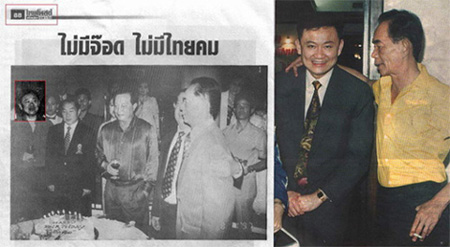Perceptions of world leaders often differ
By Roger MittonVolume 31, No. 612
January 30 - February 5, 2012
IT is odd how foreign observers often have a different perception of a country’s political leader than citizens of that country do.
Take the case of Malaysia’s former Prime Minister Mahathir Mohamad, who was roundly despised in the West, especially in the United States.
But at home, Mahathir was viewed, rightly, as a visionary leader who turned his formerly docile and disparate nation into an economic powerhouse.
In a reverse way, former Philippine President Gloria Macapagal-Arroyo was feted in Washington and other Western capitals, while steadily inspiring revulsion among her compatriots.
Which brings us to the curious case of Thailand’s opposition leader, Abhisit Vejjajiva, who lost last July’s general election and ceded the prime minister post to Yingluck Shinawatra, a political novice.
His loss baffled most foreigners, who had always regarded Abhisit as a splendid national leader and a future Mahathir-like regional giant.
Yet he proved a weak and vacillating prime minister after his unexpected, and arguably illegitimate, accession to the post in December 2008.
It is a bit curious, since Abhisit, 47, is a pleasant enough chap, who is undeniably clever, photogenic and articulate.
But he is simply a lousy politician and a pawn of the elite. As well, he is a man who appears to his fellow Thais as more British than the British – again, curious, since he is ethnic Chinese.
But he was born in England, educated at Eton and Oxford, carries British citizenship and has a British name, Mark.
Simplistic though it may sound, that is why Westerners like him so much. He is one of them.
His fellow Thais, however, do not share that sentiment, and he appears congenitally unable to strike a rapport with them, especially with the vast majority of common rural folks.
Consequently, there is now widespread griping over his performance within the ranks of Abhisit’s own Democrat Party.
Even the Bangkok Post, a staunchly pro-Abhisit organ, recently reported that “party members have refused to keep their displeasure with the party leadership bottled up”.
As if chastising a wayward teenager, the reports slam Abhisit for “mixing with the wrong crowd” – namely young sycophants whose political acumen is, to put it mildly, badly skewed.
As a result, there are now aspiring challengers who are already effectively campaigning to replace Abhisit.
The number one Brutus is Abhisit’s buddy and former finance minister, Korn Chatikavanij.
Like Abhisit, Korn is also a member of the Bangkok bourgeoisie and also attended private school in England and then went to Oxford.
Korn’s co-quisling, playing the part of Cassius, is the royalist governor of Bangkok, Sukhumphand Paribatra, whose elitist connections are even tighter than those of Abhisit and Korn.
Sukhumphand, who sees himself as a kind of Boss Geddes of the sprawling capital, loathes Abhisit and has no qualms about using the governorship to undercut his titular boss.
Bangkok is the party’s heart and soul, and if the Democrats cannot build on the seats they have there, they are dead. The dreamy Sukhumphand thinks he, not Abhisit, is the man to do that.
Yet while the Democrats appear to be caught between a rock and a hard place, there may be a way out, if Abhisit can shelve his callow, effete demeanour and get down and dirty.
It is not impossible, as he has shown when he speaks about his nemesis, former Prime Minister Thaksin Shinawatra, the elder brother of current PM Yingluck.
Abhisit once told me, with his lips curling vituperatively: “Thaksin is nothing. There is nothing there. The Democrats will never form a coalition with his party while I am leader.”
Now, if only he could put on a steel glove and talk more like that, and learn to eat fish balls with the plain folks in the paddy fields, he’d have a chance of keeping his job.
But until that happens, the Democrats must resign themselves to a long sojourn in the political wilderness.
http://www.mmtimes.c.../news61203.html
คนพม่าไม่โง่แฮะ






























































